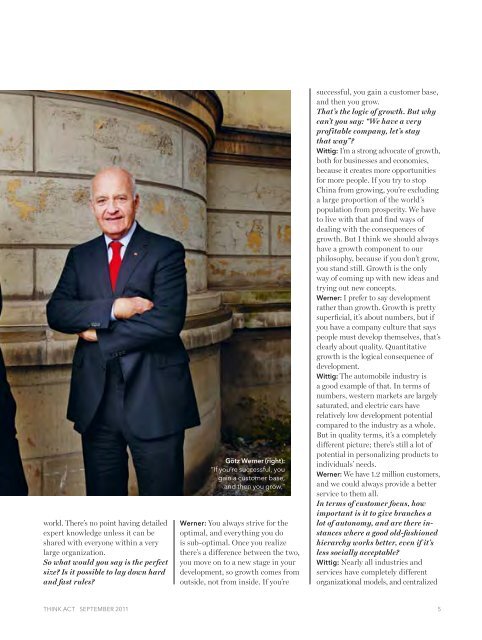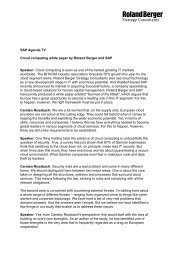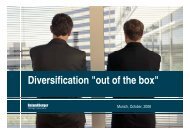think: act magazine No. 17 - Size Matters - Roland Berger
think: act magazine No. 17 - Size Matters - Roland Berger
think: act magazine No. 17 - Size Matters - Roland Berger
Create successful ePaper yourself
Turn your PDF publications into a flip-book with our unique Google optimized e-Paper software.
world. There’s no point having detailedexpert knowledge unless it can beshared with everyone within a verylarge organization.So what would you say is the perfectsize? Is it possible to lay down hardand fast rules?Götz Werner (right):“If you’re successful, yougain a customer base,and then you grow.”Werner: You always strive for theoptimal, and everything you dois sub-optimal. Once you realizethere’s a difference between the two,you move on to a new stage in yourdevelopment, so growth comes fromoutside, not from inside. If you’resuccessful, you gain a customer base,and then you grow.That’s the logic of growth. But whycan’t you say: “We have a veryprofitable company, let’s staythat way”?Wittig: I’m a strong advocate of growth,both for businesses and economies,because it creates more opportunitiesfor more people. If you try to stopChina from growing, you’re excludinga large proportion of the world’spopulation from prosperity. We haveto live with that and find ways ofdealing with the consequences ofgrowth. But I <strong>think</strong> we should alwayshave a growth component to ourphilosophy, because if you don’t grow,you stand still. Growth is the onlyway of coming up with new ideas andtrying out new concepts.Werner: I prefer to say developmentrather than growth. Growth is prettysuperficial, it’s about numbers, but ifyou have a company culture that sayspeople must develop themselves, that’sclearly about quality. Quantitativegrowth is the logical consequence ofdevelopment.Wittig: The automobile industry isa good example of that. In terms ofnumbers, western markets are largelysaturated, and electric cars haverelatively low development potentialcompared to the industry as a whole.But in quality terms, it’s a completelydifferent picture; there’s still a lot ofpotential in personalizing products toindividuals’ needs.Werner: We have 1.2 million customers,and we could always provide a betterservice to them all.In terms of customer focus, howimportant is it to give branches alot of autonomy, and are there instanceswhere a good old-fashionedhierarchy works better, even if it’sless socially acceptable?Wittig: Nearly all industries andservices have completely differentorganizational models, and centralizedTHINK Act september 2011 5

















